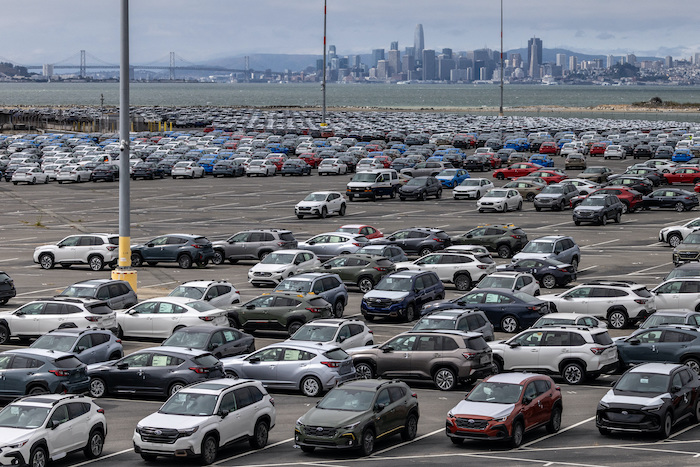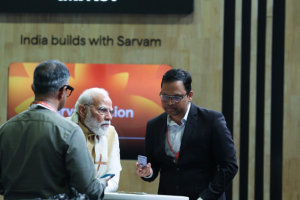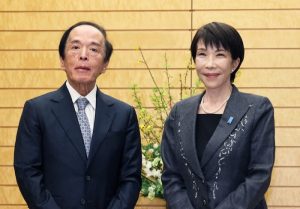US tariffs have hit the Japanese economy hard, causing a contraction of almost 2% in the three months to the end of September.
The contraction, revealed by government data on Monday, was the first in 18 months and stemmed from a plunge in shipments by carmakers, after a period of heightened exports before tariffs came into effect.
But economists said the country has likely suffered a temporary setback rather than the start of a recession, because the overall contraction was not as acute as expected.
ALSO SEE: Yttrium is Latest Rare Earth Concern as Global Supplies Fall
“The contraction is largely due to one-time factors such as housing investment” affected by regulatory change, said economist Kazutaka Maeda at Meiji Yasuda Research Institute.
“Exports also reacted,” he said. “Overall, the economy lacks strong underlying momentum, but the trend still points to a gradual recovery over the next year or two.”
Economists generally viewed this quarter’s GDP figures as having a marginal impact on Bank of Japan thinking when next deciding interest rates versus factors such as inflation. However, an economist close to Prime Minister Sanae Takaichi gave the data more weight.
Given the contraction, it “would be misguided for the BOJ to decide to raise interest rates” in December, Credit Agricole chief Japan economist Takuji Aida, who is on Takaichi’s flagship panel tasked with laying out the country’s growth strategy, said in a report to clients.
Carmakers fought tariffs with price cuts
Gross domestic product contracted 1.8% in July-September. That compared with revised growth of 2.3% in the previous three-month period, but was less than the 2.5% contraction that economists on average estimated in a Reuters poll.
The reading also translated into a quarterly contraction of 0.4% versus the median estimate of 0.6%.
Exports constituted the main drag as the impact of higher US tariffs intensified. Automakers saw shipment volume plunge, reversing earlier front-loaded exports ahead of tariff hikes, though they mostly absorbed tariffs by cutting prices.
Net external demand, or exports minus imports, knocked 0.2 of a percentage point off growth, versus a 0.2 point positive contribution in April-June.
The US and Japan formalised an agreement in September that implemented a baseline 15% tariff on nearly all Japanese imports, versus an initial 27.5% on autos and 25% for most other goods.
Private consumption edges up
Housing investment also weighed on growth as tighter energy-efficiency regulation introduced in April slowed commitments.
Private consumption, which accounts for over half of economic output, grew 0.1%, matching a market estimate. That was cooler than the 0.4% of the second quarter, indicating that high food costs increased people’s reluctance to spend.
Capital spending, another key driver of private demand-led growth, rose 1.0% in the third quarter, which was well over a market estimate of 0.3%.
“Private consumption rose for the sixth straight quarter, and capital expenditure increased for the fourth consecutive quarter,” Minoru Kiuchi, the economic revitalisation minister, said in a statement.
“This reinforces our view that the economy remains on a moderate recovery path,” he said.
Private-sector estimates reflect an expectation that growth will rebound in the October-December quarter. A poll of 37 economists by the Japan Center for Economic Research projected a 0.6% expansion.
The weak GDP data comes as Takaichi’s government compiles a stimulus package to help households manage rising living costs.
Advisers to Takaichi have cited a likely sharp GDP contraction as a reason for aggressive stimulus measures.
Finance Minister Satsuki Katayama told reporters on Sunday that the proposed economic stimulus would exceed 17 trillion yen ($109.94 billion), media reported.
“From late this winter through around spring, there will be measures that improve households’ income conditions in real terms,” said Nomura Securities economist Uichiro Nozaki. “Therefore, in terms of underpinning consumption in the first half of next year, this is a positive factor.”
- Reuters with additional editing by Jim Pollard
ALSO SEE:
Japan’s Megabanks Raise Profit Forecasts as Deflation Eases
Japan’s New PM Working on ‘Bold’ Stimulus Package, Draft Shows
Japan Signs Rare Earths, Nuclear Power Deal With Trump
Japan’s New PM to Meet Trump, ‘Will Buy US Soybeans, Pickups’
Nikkei Soars, Yen Sinks After Takaichi Picked as Japanese PM
Japan’s Topix Hits Record Peak, Yen Sinks as PM Ishiba Resigns
US Lowers Japan Auto Tariffs But Some Carmakers Still Hurt
Japan and US ‘Finalising Deal on Lower Auto Tariffs, Other Issues’
Japan Wants Issues Sorted Before Trade Rep Seals Big Tariff Deal
Political Uncertainty in Japan Clouding Rate Hikes, Budget
Toyota Slashes Profit Forecast, Sees $9.5 Billion Tariff Hit
























